#Prussian history
Explore tagged Tumblr posts
Text

Fratte gang I haven't forgotten about you. Here's a quick redraw in the midst of commissions and work.
The quote is from Michael Roes' Zeithain.
#artists on tumblr#my art#frederick the great#feels good to type this tag again#we're so back#friedrich der große#hans hermann von katte#fratte#WE'RE SO BACKKK#prussian history#sort of#prussian sillies#redraw#zeithain
224 notes
·
View notes
Text




“Poor Blucher went mad for some time. He had shown off before some of our ladies, and got a fall from his horse and a blow on his head. This gave him all sorts of strange fancies. When I went to take leave of him, he positively told me he was pregnant! And what do you think he said he was pregnant of? – An elephant! And who do you think he said had produced it? – A French soldier!…”
- Recounted by Wellington to Stanhope, unknowingly exemplifying the dangers of directly translating your language to English without any context.
There’s a bit of a comedic story involving a Prussian diplomat during the War of the Third Coalition, Prussia being one of the main boss enemies during the early revolution was dragging its feet to declare war this time. Finally about to do it, the diplomat arrives just in time to hear the result of the battle of Austerlitz, and instead congratulates the French.
Queen Louise being one of Napoleon’s biggest haters on the continent is another funny little quirk about the Prussians.
As for their uniforms? The reference book really only covered the later army, but you can get a feel of the military practicality present. Overcoats, blankets, blues and grays, the Russo-German legion was dripped out a bit. The cavalry wasn’t too bad either.
From Blucher’s Army, 1813-15.
#napoleonic era#napoleonic wars#napoleon#prussian history#Prussia#germany#france#1800s#19th century#military art#uniform#soldier
148 notes
·
View notes
Text

Post after a long time, got to drawing some historical figures. Sometimes you just gotta embrace the history ships
Frederick and Katte holds a special place in my heart
70 notes
·
View notes
Text

~ Heinrich von Angeli, Princess Augusta Viktoria of Prussia (1880) (detail)
via wikimedia commons
#heinrich von angeli#augusta viktoria of schleswig-holstein#augusta victoria of schleswig-holstein#fine art#painting#oil painting#art history#art detail#painting detail#old painting#german history#prussian history#old royals#old royalty#prussian royal family#victorian#victorian era#victorian painting#victorian art#19th century art#1880s#1880s fashion#1880#historical fashion#fashion nistory#e
37 notes
·
View notes
Text

Image: Rudolf Petereit. The Girl of the Lagoon. 1864
Prussian Art History
The fine art of East Prussia reflected many international cultural connections, interweaving many styles and trends of European art. Due to the complicated history of the region, many artists were forgotten, many works were lost, some became private property, and only a few ended up in museums. Thus, Popov’s collection is valuable not only aesthetically, but also historically and educationally...
...oil, tempera, water colour and pastel paintings, prints made using various graphic art techniques, drawings and reproductive prints represent the most significant phenomena of fine art history in East Prussia – the Königsberg Art Academy and the Artists’ Colony of Nida (Nidden), as well as the works of painters that were born, permanently lived or occasionally visited this region.

Image: Bruno Bielefeld. Lake in the Forest. Oil on canvas. 19th century
...from Academism, sentimental Realism, late Impressionism, and Naturalism, to Expressionism and New Objectivity. Some works, created in the second half of the 20th century and which represent late Expressionism, reveal a phenomenon of East Prussian fine arts post-1945: unable to return to their beloved places, painters created paintings by memory, based on their impressions deep in their minds.

In 1709, Friedrich Wilhelm built the Schloss Charlottenburg as a summer palace for his wife Sophie Charlotte. His son, Elector Friedrich III, who became Frederick I the first King of Prussia from 1701, continued the mission to build a royal capital—now befitting a Prussian capital—hiring court architects and sculptors like Andreas Schluter, Johann Arnold Nering and Martin Grünberg.
Schluter’s most famous baroque-influenced work was the Royal Palace. Still, he was also responsible for the equestrian statue of Frederick I that today. Still, he was also responsible for the equestrian statue of Frederick I that today fronts the Schloss Charlottenburg, and the sculptural decorations for the Zeughaus.

The Zeughaus, best known for housing the Deutsches Historisches Museum (German History Museum), was designed by Schluter, Nering, Grünberg, and Jean de Bodt. Built between 1695 and 1729, it’s the oldest building on Unter den Linden. Another grand example of baroque can be found of course at Sansoucci in Potsdam, which was built a little later (between 1755-1764) as a summer residence for Frederick The Great.
#Prussia#prussian history#art history#19th century art#landscape#painting#history#german art#art#architecture#european art#european history#lost history#forgotten history
33 notes
·
View notes
Text


Negotiations of the Franco-Prussian Treay of Tilsit, 6th July 1807
#artists on tumblr#tried to recreate the irritated white monkey-cat thing meme with naps#actually they are both based on memes#napoleon bonaparte#frederick william iii#queen louise#were you there?#prussian history#prussia#france
151 notes
·
View notes
Text
Frederick, the potato king
I am not a monarchist. I do, however, occassionally look at monarchs and think, huh, they seem pretty cool. Meet Frederick the Great.
Frederick ruled Prussia from 1712 to 1786. During this time he:
was woken up by a cannon each morning, because his father wanted him to be a military leader
wrote "Anti-Machiavel", a rebuttal to Machiavelli's The Prince
was gay
married a woman to keep his father happy, then separated from her, gave her a palace and visited her once a year for her birthday
was friends with Voltaire
was king of Prussia but wrote exclusively in French. Frederick was a bit of a Francophile, mostly because his dad hated the place
introduced potatoes and turnips to Prussia, and was known as "Der Kartoffelkönig". Potatoes were initially unpopular, so Frederick had them planted and guarded so they looked expensive and desirable. However, the guards were told to let people steal the potatoes
his head was permanently tilted to one side because he spent so long playing his flute
opened the first veterinary school in Prussia
gave everyone free entry to the opera
sheltered Jean-Jacques Rousseau
was bad at spelling (a relatable icon) (also, he was writing in French, and French spelling is even more ridiculous than English)
drank eight cups of coffee each day, mixed with mustard and peppercorns. The cannon alarm clock was discontinued after his father died, so I guess eight cups of coffee would probably be just as effective for waking one up
his lasts words were "cover the dog, he's shivering".
wanted to be buried with his greyhounds. This didn't happen, but now he had a nice gravestone and people leave potatoes there
#potatoes#potato#history#prussian history#the enlightenment#frederick the great#frederick ii#historical gay figures#gay history#lgbtq history
142 notes
·
View notes
Text

Hans Heinrich von Katte wasn't known for his... Fatherly love, but at least he can now serve the kingdom in a kinda inaccurate 1741 cuirassier uniform!
Buon fucking giorno everyone!
Pose credits: Pinterest
#hans heinrich von katte#prussian history#prussian uniform#frederick the great#artists on tumblr#my art
46 notes
·
View notes
Text
The anti Machiavel is so funny to me. Write a book countering The Prince by Machiavelli, then proceed to be a similar type of leader to what was described [militarily] and then try really hard not to get that book published. Congratulations, you are now a hypocrite. Nobody was moving like Frederick II of Prussia truly. Better luck next time, Fritz. 🫶
#frederick the great#frederick ii#friedrich ii of prussia#friedrich der große#friedrich ii#prussia#prussian history#history#fritz.txt#history tag
15 notes
·
View notes
Note
HAAAIII from a blücher fan from another..... Where do I find / read his memoir 💔💔??
Finally...someone on this platform with taste... You should be able to find them quite easily with a quick search on book archive websites (Internet Archives, Project Gutenberg, etc. etc...) or order them with your local libraries if you're that committed. Here are some I've been meaning to get around to reading:
- The Life and Campaigns of Field-Marshal Prince Blücher (The definitive Blücher Bible, everyone say "thank you Gneisenau") - Blücher: Scourge Of Napoleon (Usual jazz + has a bunch of details about his life post-Waterloo) - Blücher And The Uprising Of Prussia Against Napoleon (Contextualises Blücher during the French occupation of Prussia) - Memoirs of Prince Blücher (Had tidbits in the first three chapters but is technically about the fourth prince of Wahlstatt-- a treat for the WWI girlies if you will...) - And this RPF novel that features a bunch of other figures from that period
#these five are the only main ones I've found available online and in English anyways#I've only just finished the fourth one#but honestly. this is already quite a lot LMAO#hope this helps. teehee#OH there was also this other book by Paul Prosper Vermeil de Conchard that compiles Blucher's correspondences specifically#I was unable to find an English translation in digital form but if anyone could please let me know#blücherposting#gebhard leberecht von blucher#blucher#napoleonic era#benny's postbox#prussian history
35 notes
·
View notes
Text

a small redraw c: he's wearing pink and lilac and he stares into your soul
#my art#artists on tumblr#frederick the great#friedrich der große#prussian history#i got better at this#i'm very proud of myself c:
488 notes
·
View notes
Text
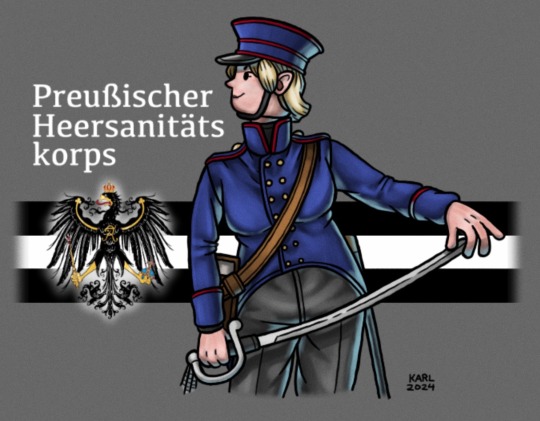
Preußischer Heersanitätskorps - Prussia
Also an OC named Franziska Schäffer.
Back at it again with another Guts and Blackpowder OC. This time, its a Surgeon from the Kingdom of Prussia. Franziska Schäffer is a young woman who tried to sneak into the Army by disguising herself as a man only to be with her lover in the battlefield; Her small bust and short stature (plus her seemingly deep voice) made her look and sound like a young adult. To add to her disguise, she trimmed her hair to match up with the rest of the soldiers. She is a member of the Preußischer Heersanitätskorps, but wishes to be part of the 1. Garde Regiment zu Fuß where her lover is in. She also is an excellent cook who wishes to open up a restaurant once the Blight has ended.
Schäffer first appeared in the events of Kaub where she was miraculously reunited with her lover in a church (starting area). They are joined with a German Chaplain as well as Several Russian and French Soldiers.
Franziska could possibly be a historically accurate character since there were some women who snuck into the ranks of the Prussian Army by crossdressing as men. Eleonore Prochaska (seen in the character sheet) is a perfect example of one.
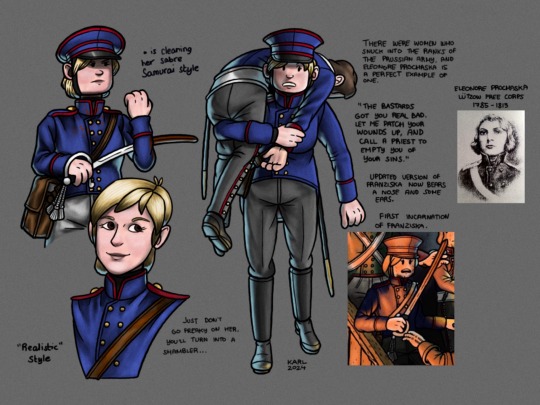
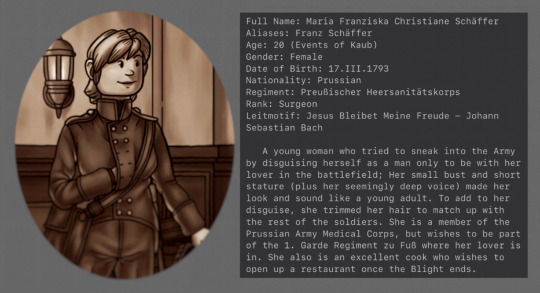
#concept art#illustration#artists on tumblr#digital illustration#video games#drawing#sketch#roblox#guts and blackpowder#g&bp#g&b#oc artist#oc art#my ocs#oc artwork#ocs#oc#napoleonic wars#napoleonic era#prussian blue#prussian history
22 notes
·
View notes
Text
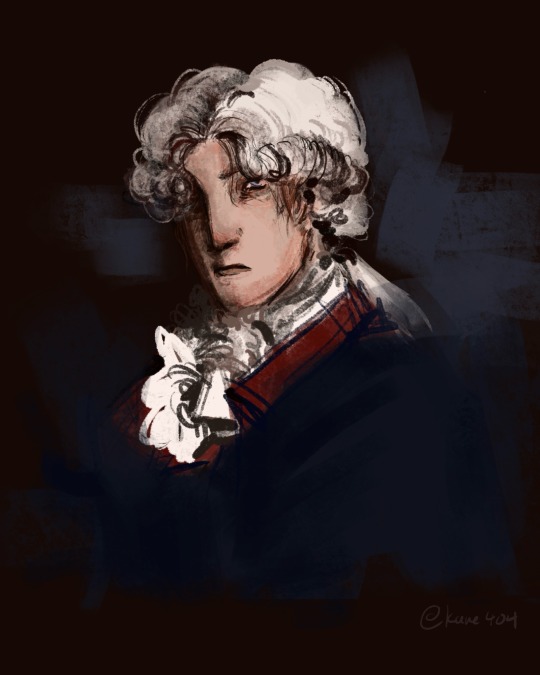
His majesty the king
I drew this while being very emotional
20 notes
·
View notes
Text
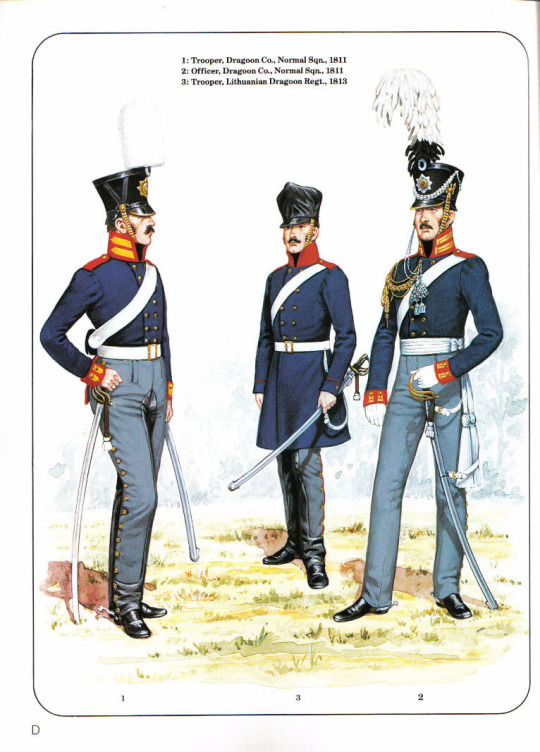
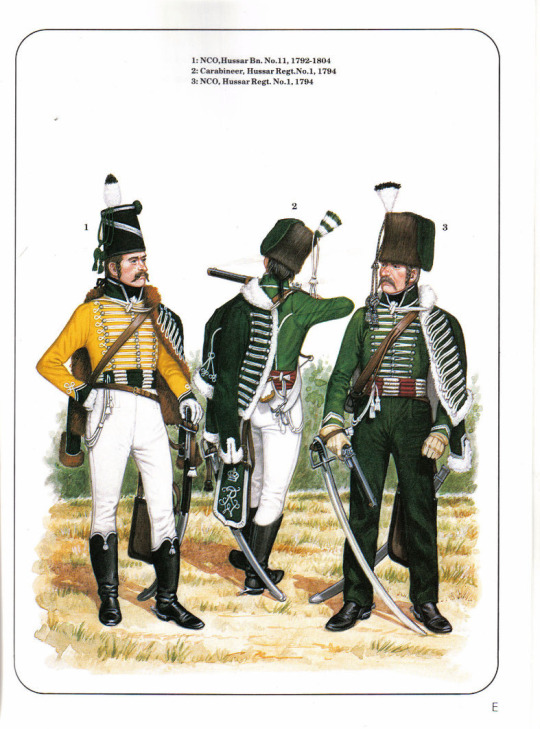
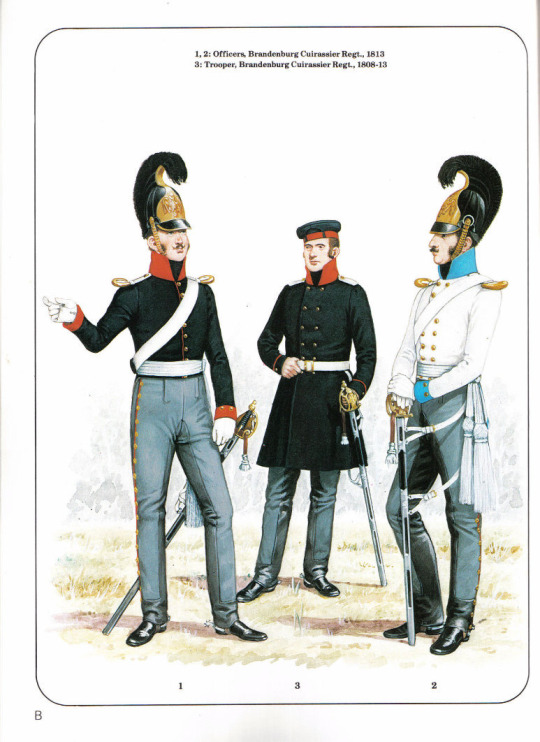
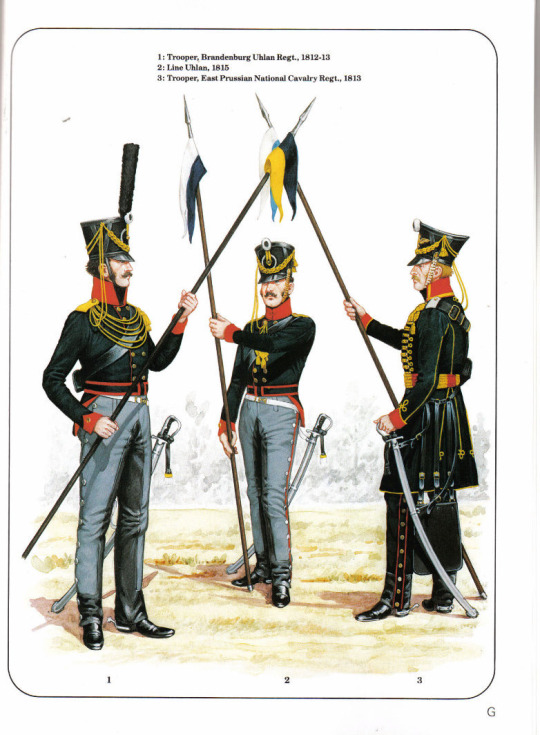
“Prussia was hatched from a cannonball”
-Napoleon
But not to diss the Prussians as much as I did in the prior post, it’s pretty hard to mess up a good cavalry uniform. Here are some over the span of ~20 years.
From Prussian Cavalry of the Napoleonic Wars: 1792-1807 + 1807-1815.
#napoleonic era#napoleonic wars#napoleon#prussian history#germany#military art#military history#history#military soldier#cavalry
21 notes
·
View notes
Text

Augusta Viktoria of Schleswig-Holstein by Alexander Bassano (c.1880)
via royal collection trust
#augusta viktoria of schleswig-holstein#augusta victoria of schleswig-holstein#german empress#german empire#queen of prussia#wilhelm ii#alexander bassano#old photo#old photograph#old royals#german history#prussian royal family#prussian history#old royalty#victorian photo#antique photo#antique photograph#vintage photograph#portrait photography#1880s#victorian era#victoriana#19th century photography#e
44 notes
·
View notes
Text

look at these idiots
#artists on tumblr#prussia#prussian royal family#prussian history#frederick the great#friedrich der große#frederick william i#frederick iii#wilhelm ii#too lazy to tag them all
144 notes
·
View notes